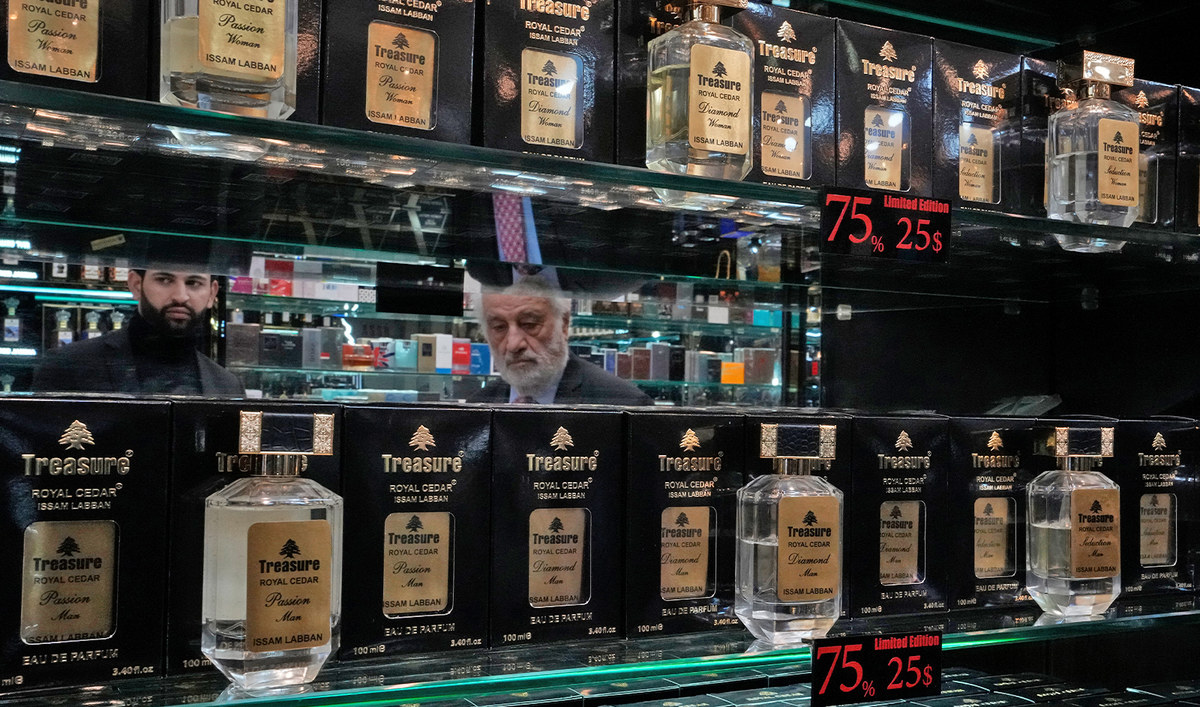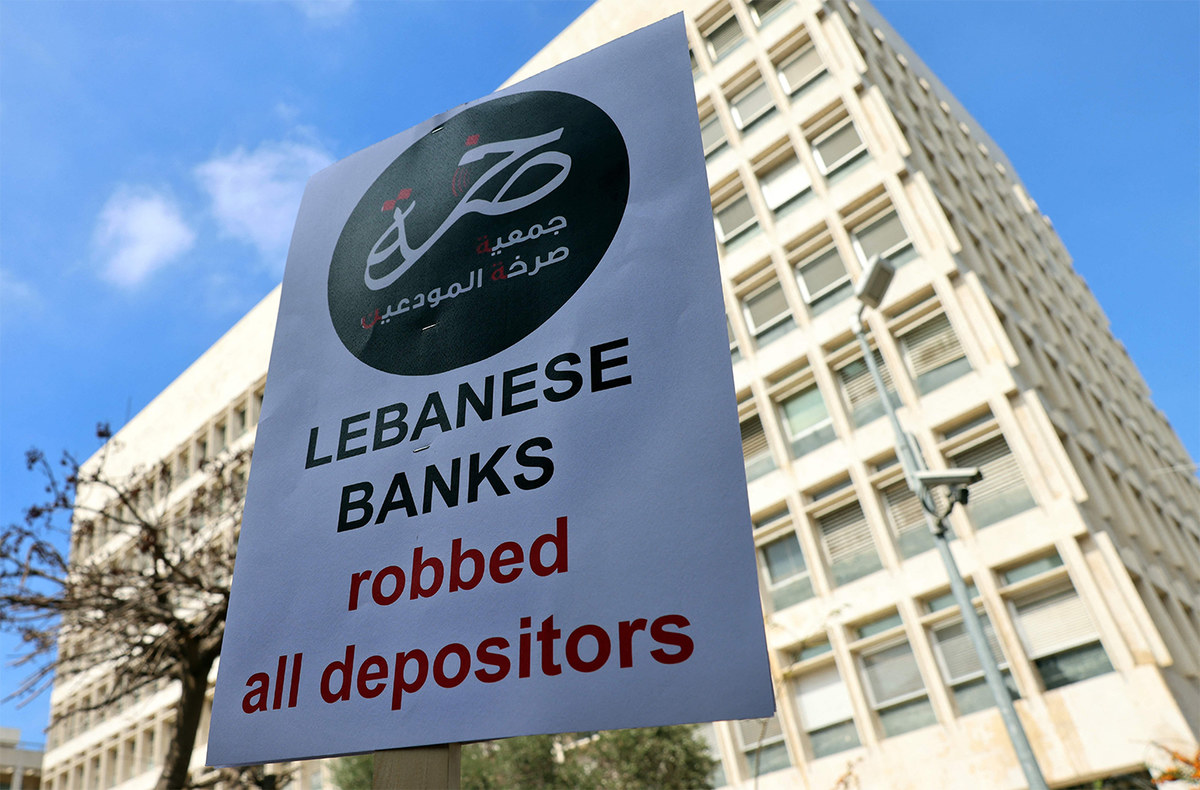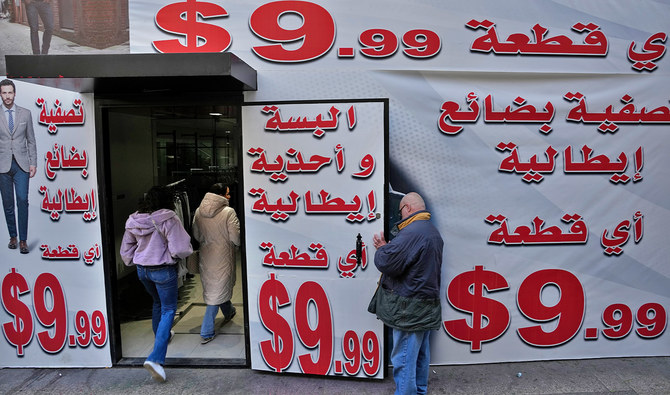BEIRUT: When Moheidein Bazazo opened his Beirut mini-market in 1986, during some of the fiercest fighting in Lebanon’s civil war, he didn't expect it to thrive. But several years later, he had shelves full of food and needed 12 employees to help him manage a bustling business.
Those days are over. Bazazo now mostly works alone, often in the dark to reduce his electric bill. Regular customers are struggling to make ends meet, and as they buy less so does he, leaving some shelves and refrigerators bare.
With the Lebanese economy in shambles and its currency in free fall, Bazazo spends much of his time trying to keep up with a fluctuating exchange rate. Businesses like his are increasingly leaning on one of the world’s most reliable assets — the U.S. dollar — as a way to cope with the worst financial crisis in its modern history.
“I once lived a comfortable life, and now I’m left with just about $100 after covering the shop’s expenses" at the end of the month, Bazazo said, crunching numbers into a calculator. “Sometimes it feels like you’re working for free.”
The Lebanese pound has lost 95% in value since late 2019, and now most restaurants and many stores are demanding to be paid in dollars. The government recently began allowing grocery stores like Bazazo’s to start doing the same.
While this “dollarization” aims to ease inflation and stabilize the economy, it also threatens to push more people into poverty and deepen the crisis.

Prices are seen marked in U.S. dollar instead of the Lebanese pounds in a store in Beirut, Lebanon, on March 1, 2023. (AP)
That's because few in Lebanon have access to dollars to pay for food and other essentials priced that way. But endemic corruption means political and financial leaders are resisting the alternative to dollarization: long-term reforms to banks and government agencies that would end wasteful spending and jump-start the economy.
Other countries like Zimbabwe and Ecuador have turned to the dollar to beat back hyperinflation and other economic woes, with mixed success. Pakistan and Egypt also are struggling with crashing currencies but their economic crises are largely tied to an outside event — Russia's war in Ukraine, which has caused food and energy prices to soar.
Lebanon's woes are much of its own making.
As the country felt the impacts of the COVID-19 pandemic, a deadly Beirut port explosion in 2020 and Russia’s invasion of Ukraine, its central bank simply printed more currency, eroding its value and causing inflation to soar.
Three-quarters of Lebanon's 6 million people have fallen into poverty since the 2019 crisis began. Crippling power cuts and medicine shortages have paralyzed much of public life.
Currency shortages prompted banks to limit withdrawals, trapping millions of people’s savings. It’s led some in desperation to hold up banks to forcibly take back their money.
The damage of the last few years was magnified by decades of economic mismanagement that allowed the government to spend well beyond its means. The head of the country's Central Bank was recently charged with embezzling public funds and other crimes.

In this file photo taken on October 5, 2022, demonstrators carry banners during a protest organised by the "Depositors' Outcry" association outside the Central Bank in Beirut to ask for deposits blocked in Lebanese banks. (AFP/File)
The pulverized Lebanese pound fluctuates almost hourly. Though officially pegged to the dollar since 1997, the pound's value is dictated now by an opaque black market rate that has become standard for most goods and services.
Last month, its value fell from about 64,000 pounds to the dollar to 88,000 on the black market, while the official rate is 15,000. Making things worse for a country reliant on imported food, fuel and other products priced in dollars, the government recently tripled the amount of tax — in Lebanese pounds — that importers must pay on those goods.
This will likely lead to more price hikes. For small businesses, it could mean selling products at a loss just minutes after stacking them on the shelves.
Dollarization could give the impression of greater financial stability, but it also will widen already vast economic inequalities, said Sami Zoughaib, an economist and research manager at Beirut-based think tank the Policy Initiative.
“We have a class that has access to dollars … (and) you have another portion of the population that earns in Lebanese pounds that have now seen their income completely decimated,” Zoughaib said.
The shift to a more dollar-dominated economy happened not by government decree, but by companies and individuals refusing to accept payment in a currency that relentlessly loses value.
First, luxury goods and services were priced in dollars for the wealthy, tourists and owners of private generators, who have to pay for imported diesel. Then it was most restaurants. And now grocery stores.
Caretaker Economy Minister Amin Salam said the Lebanese pound was “used and abused” over the past three years and that dollarizing grocery stores will bring some stability to fluctuating exchange rates.
As more people and businesses reject the local currency, the dollar gradually becomes the de facto currency. The lack of trust in the Lebanese pound has become irreversible, said Layal Mansour, an economist specializing in financial crises in dollarized countries.
“People are fed up with the fluctuation of the dollar rate, and having to spend lots of time changing it, so practically, on a societal level, it's better to use dollars,” Mansour said. “This is the end of the Lebanese pound as we know it.”
Without a strategy to address the economy's underlying problems, the government “is allowing this to happen,’’ said Lawrence White, an economics professor at George Mason University.
Dollarization means the Central Bank can’t keep printing currency that fuels inflation, and having a more reliable currency might create more confidence for businesses. But many people could be further squeezed if Beirut officially adopts the greenback as its currency.
Millions in Lebanon who tolerated the dollarization of luxury items may not respond similarly to groceries, whose prices were already surging at some of the highest rates globally.
Over 90% of the population earns their income in Lebanese pounds, according to a 2022 survey by the International Labor Organizaton and the Lebanese government's statistics agency. Families that receive money from relatives abroad spend much of it keeping the lights on and covering medical expenses.
They would have to be paid in dollars to adequately adjust, which most businesses and employers, especially the Lebanese state, are short on.
Public school teachers have been on strike for three months because their salaries barely cover the cost of gasoline to commute. Telecom workers are threatening walkouts because their wages have not been adjusted to the Lebanese pound's falling value.
Lebanon is nowhere near implementing the kinds of reforms needed for an International Monetary Fund bailout, such as restructuring banks and inefficient government agencies, reducing corruption, and establishing a credible and transparent exchange-rate system.
Zoughaib, the Beirut economist, said he fears the absence of sound policy and economic reforms means that dollarization will likely only deepen poverty, making it even more difficult for families to pay for health care, education and food.
Bazazo, the market owner, acknowledges that pricing in dollars will help him manage his finances and cut a small portion of his losses but worries it will drive away some customers.
“Let’s see what happens,” Bazazo said, sighing. “They’re already complaining.”























